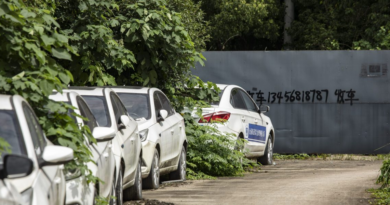Struggling Volvo Cars says ‘safety is our superpower’ as EV ambitions dashed by flatlining market
Volvo Cars has a message for skeptical investors as it seeks to rebound from a stock market hammering and stunted profit margins: “Safety is our superpower.”
The family-oriented, safety-obsessed Swedish carmaker, has won huge market share with young families over its nearly 100-year history thanks to its low injury rates in collisions.
By some accounts, its flagship XC90 SUV, launched in 2002, has never had a single driver or passenger fatality reported in the U.K.
Vovlo Cars, though, is at an inflection point as the global car industry struggles with slowing demand for electric vehicles. With its share price slumping at a record low and doubts emerging over its long-term strategy, the automaker is taking a very cathartic approach to marketing its unique selling point: safety.
Volvo is a “premium” brand, in other words, a carmaker that has a product customers are willing to pay a premium to obtain. Aside from its growing tech capabilities, that premium is safety in Volvo’s case.
“You have your first child, you come home from the hospital, and you start thinking about safety in a much more visceral way,” Volvo CEO Jim Rowan told an audience during a Q&A at Volvo’s CMD.
“Safety is our superpower.”
Volvo has always said that it believes customers place a premium on safety. When asked by Fortune how Volvo differentiates itself from Polestar, the struggling EV brand with close ties to Volvo through their shared majority shareholder Geely, Rowan doubled down on that distinction.
While Polestar’s USP lies in its slogan “Pure progressive performance,” Volvo’s lies in “safety, sustainability, human-centric design, and family-oriented customers,” Rowan told Fortune.
Volvo is struggling with a flat EV market. Several factors, including falling consumer sentiment, the pullback of Government subsidies, and rising global tariffs, have helped push the carmaker’s stock down to a record low since it first floated publicly in 2021.
On Thursday, Volvo said it would shift its key target to growing market share in the premium category rather than increasing revenue. It is also ditching a pledge to only sell electric cars from 2030, extending its sale of hybrids into the next decade. In a flat market, the carmaker says, the best way to grow is by taking customers from other brands.
To grab market share, Volvo is hammering home its safety proposition.
As part of its 90/90 presentation on Wednesday, where it unveiled its new hybrid XC90 and its electric EX90, Volvo showed an incredibly dramatic advert detailing a couple having their first child, jumping ahead through the daughter’s formative years.
Towards the end of the advert, we cut to the soon-to-be mother walking across the road when a careless Volvo driver nearly runs her down. However, she is halted by the car’s sensor, which spots a person on the road. Volvo says in the advert that sometimes the moments that don’t happen are the most important of all.
Volvo’s safety premium
Volvo’s safety ambitions are getting a boost with artificial intelligence.
Volvo’s chief of engineering and technology officer, Anders Bell, described how 50 years ago, the carmaker would be on the scene of accidents with measuring tapes, assessing skidmarks and other crash indicators that would better inform Volvo’s designs. The group also introduced behaviorists to better understand how humans acted in the build-up to accidents.
“Now we’re going to equip that process with this superpower,” Bell said of the use of generative AI in its cars, “which is real-time, real-world insight, which will significantly shorten our path to conclusions.”
On Thursday, Volkswagen said it was extending its partnership with Nvidia, using a core computing chip in collaboration with one of the world’s largest companies.
The group’s tech partnerships, which also include Google, Qualcomm, and Luminance, will give drivers more indicators to improve active safety, the terminology used to describe the prevention of crashes. Volvo is already a leader in passive safety, which seeks to prevent injury and death when a collision occurs.
Bell says Volvo needs to do better at reassuring drivers that their data won’t be shared with third parties, suggesting it has struggled to gain an adequate data set to drive forward with its technological ambitions.
Changing landscape
Volvo’s new focus on automation to identify safety follows several other companies working to automate their cars and reduce collisions. Tesla has led in innovation in this field, but other carmakers are fast adopting similar tech. While full self-driving technology remains a hypothetical idea, it also feels inevitable.
In a world where all cars are automated, safety could become a default among all car brands, rather than a differentiator for Volvo.
However, Erik Severinson, Volvo’s chief strategy and product officer, told Fortune that Volvo’s safety proposition goes beyond automation.
“We will never compromise on passive safety or all the other stuff which makes it more safe. I think safety will still be a brand differentiator going forward, maybe more so than performance,” Severinson said.
Long-term shifts in demographics, meanwhile, are creating new customer challenges in several industries. In Japan, an early harbinger of the fallout of a population slowdown, diaper manufacturer Oji Holdings said it would be pivoting to adult products amid plummeting demand for children’s diapers.
People across the Western world are also having fewer children, a result of falling affordability and changing cultural norms that lead women to have their first child later in their lives.
With such an emphasis on new families as the target for Volvo cars, it begs the question of whether a changing landscape could pose another threat to Volvo’s safety USP.
While Severinson thinks the global trend of falling birth rates is a worrying one, he doesn’t see it drastically affecting Volvo’s place in the market.
“I mean, your kids have friends,” Severinson told Fortune of the potential for a falling childbirth affecting demand for his family-oriented brand.
“Even if the number of kids is shrinking in total in society, I think the number of families might still be relatively the same, it’s just that you get you get fewer kids. And then safety will be just as important for those families, or even more so.”



